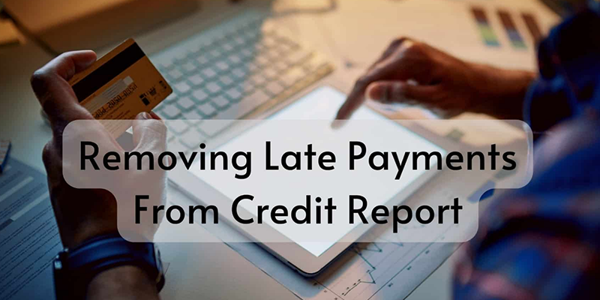How To Remove Late Payments From Your Credit Report
Late payments can hurt a credit report for years. Even one missed payment can lower a credit score and make it harder to borrow money in the future.
Lenders use credit reports to assess whether an individual is a suitable borrower. When they see late payments, they may offer loans with high interest rates or refuse to extend credit altogether.
But here’s the thing: not all late payments have to stay on a report forever. Some can be fixed or removed the right way. This is not about tricking the system. It’s about knowing what to do, being responsible, and acting like a grown-up when it comes to money.
Why Late Payments Matter So Much
Payment history accounts for a significant portion of a credit score. It accounts for approximately 35% of the total score, according to credit bureaus. One late payment can stay on a credit report for up to 7 years. That can cause long-term problems like:

Higher interest rates on loans
Trouble getting approved for credit cards
Higher insurance premiums
Even problems getting a job or renting a home
So, yes, one late payment does matter. But it doesn't have to stay there forever.
Step 1: Get a Copy Of The Credit Report
Before anything can be fixed, the report needs to be reviewed. Not just one report either. There are three major credit bureaus in the United States: Equifax, Experian, and TransUnion, and each one might have different information. You can get free copies of your credit reports online from sites like FreeCreditReport.com, Credit Karma, or by going directly to the official free credit report site.
Check each report carefully. Review payment dates, account names, balances, and any red markings. Take notes on which ones are late and record the reasons why.
Step 2: Dispute Errors On The Report
Some late payments occur due to errors. Yes, credit bureaus can make errors. It happens more often than most people think. If a report shows a late fee that is wrong, it can be disputed.
Write a letter to the credit bureau. Explain what is wrong and include proof. This can be:
Bank statements
Payment confirmation emails
Copies of checks or payment receipts
You don’t need to sugarcoat it. Be clear. Be firm. Use simple words like:
“This payment was not late. See proof attached. Please remove this from my credit report.”
Each credit bureau is required to investigate and respond, typically within 30 days. If the error is confirmed, it must be corrected or removed.
Step 3: Ask The Lender For a Goodwill Adjustment
Sometimes, a person genuinely misses a payment. It happens. But if it was a one-time mistake and the account is now in good standing, there's another option.
Contact the lender and request a goodwill adjustment. This means asking them to remove the late mark from the credit report out of kindness. It works better if:
The payment history is mostly good
The payment was only a few days late
The person explains the reason and shows that it will not happen again
Some lenders will say no. Others may agree. It depends on the lender and how the request is made. A short and respectful letter can make a difference. Don't beg. Don't argue. Be transparent and honest.

Step 4: Try a Pay-For-Delete Agreement
This method is not always guaranteed, and not all lenders allow it. However, sometimes a person can offer to pay off a balance in exchange for having the negative mark removed from their credit report.
This is called a pay-for-delete agreement. It should be in writing before any payment is made. It often works with collection agencies, but not all credit reporting laws support it. Still, it is worth asking.
Use a clear message like:
"I am willing to pay this amount in full. In return, I request that you remove the late payment from all credit reporting agencies."
If they agree, obtain the agreement in writing and keep a copy for future reference. Then make the payment right away.
Step 5: Wait It Out And Rebuild The Credit
Some late payments cannot be removed. That's the truth. Not all companies will agree to goodwill or delete offers. And if the late fee is correct, the law allows it to stay on the report for seven years.
But time helps. And credit reports are constantly changing. After the late payment is a year or more old, it affects the score less and less.
In the meantime, focus on building a stronger credit profile:
Pay all bills on time from now on
Keep credit card balances low
Avoid opening too many new accounts at once
Use old credit accounts to build history
Additionally, some individuals can utilise secured credit cards or credit-builder loans to help enhance their credit. These tools have a positive history if used correctly.
More lenders today also report on-time rent and utility payments to credit bureaus. This can offset one or two old late payments and improve the score over time.
A Word On Credit Repair Companies
Some companies offer to fix credit reports for a fee. Some are helpful. Others make big promises they cannot keep. Watch out for any company that:
Promises fast results or a brand-new credit score
Tells you to lie or use fake identities
Wants you to pay before they do anything
These may be signs of a scam. The Federal Trade Commission frequently warns people about this. It is often more effective and cost-efficient to resolve credit issues directly with lenders and credit bureaus.

Staying Ahead After Cleaning The Report
Once the credit report is cleaned up, keep it that way. Set up automatic payments. Use reminders. Create a money calendar. Being careless with bills causes damage that takes years to undo.
Some people do not check their credit reports until it’s too late. That is not wise. Checking often helps catch mistakes early and spot signs of identity theft.
Takeaway For The Future
Removing a late payment from a credit report is not always easy, but it is possible. Some can be removed if they are mistakes. Others may be fixed with a simple letter. Even when they can’t be taken off, it is still possible to build better credit and move forward.
There are no shortcuts. No magic tricks. Just reasonable steps, smart decisions, and patience. That is how adults manage their credit.







